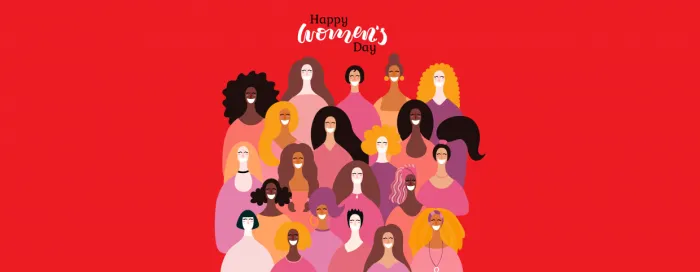The coronavirus crisis has taught us that decades of progress on gender equality can be jeopardised in just a few months – by a pandemic costing women their jobs and forcing them back into traditional gender roles at homes. At the same time, right-wing and populist governments have taken advantage of the situation to curtail women’s rights, such as in Poland with its near-total ban on abortion.
To mark International Women's Day 2021, progressive local and regional leaders from all over Europe are joining the PES Women campaign #MakeHerCount. In the context of COVID-19, the campaign features real stories by female frontline workers from across Europe, as well as support messages from many progressive leaders, drawing attention to the fact that women are working at their limit while receiving meagre pay and recognition. Together with PES Women, progressive cities and regions want to show that women's contributions count. Christophe Rouillon, mayor of Coulaines (France), and PES Group president Vasco Cordeiro, member of the regional parliament of the Azores (Portugal) and first-vice president of the European Committee of the Regions, Concha Andreu, president of La Rioja region (Spain) and PES Group vice-president, Juan Espadas, Mayor of Seville (Spain), Markus Gleichmann, member of the Landtag of Thuringia (Germany), Antje Grotheer, vice-president of Bremen City Parliament (Germany), Anne Karjalainen, member of Kerava City Council (Finland), Yoomi Renström, mayor of Ovanåker (Sweden), and María Sánchez Ruiz, Minister for the Economy and Finance of Cantabria, share their ideas:
During the pandemic, women played an essential role, keeping their communities together in many ways and keeping society moving, for example by working on the front line in essential sectors such as healthcare, childcare and education, domestic services, and the commercial and service sectors. Jobs involving long hours and low salaries, precarious working conditions and part-time employment were mainly carried out by women, jobs that involved huge responsibilities and high exposure to health risks. At the same time, women are often the ones responsible for the household, home schooling, and taking care of the family, many while teleworking. What is more, with many countries around the world in lockdown, “we saw a shadow pandemic growing, that is the one of gender-based violence against women ”, as Phumzile Mlambo-Ngcuka, Executive Director of UN Women, repeatedly warned.
All this should not be forgotten in Europe's recovery. On the contrary, we need to fully integrate the gender dimension into our response to the pandemic and put women as a powerful force at its very centre, in order to get Europe back on track.
A first and necessary step to end the discriminatory pay gap between men and women was taken by the European Commission last week.
Progressives are working to achieve the gender equality objectives enshrined in the Pillar. The Pay Transparency Directive is one necessary and long-awaited step to get closer to a more equal, just and feminist Europe. https://t.co/jllbn5yNCI pic.twitter.com/ZJYp0UpL8g
— PES Women (@PES_Women) March 4, 2021
However, this is just a start. As S&D spokesperson on women's rights and gender equality Maria Noichl MEP pointed out: “We need more concrete action, such as fair minimum wages across the EU, the swift revival and adoption of the Women on Boards Directive as well as the so-called Anti-discrimination Directive, and ratification of the Istanbul Convention to eliminate violence against women ”.
It is also important for the way ahead to enhance gender parity at local and regional political level. Only about 30% of Europe's one million local and regional elected politicians are women, so it remains crucial to tackle the barriers women face in entering politics. This is also the key message of PES Group vice-president Concha Andreu, president of La Rioja region, Spain, and rapporteur for the EU's Gender Equality Strategy who underlined at today's Committee of the Region's For more women in politics event:
“Despite the fact that 45% of members of regional parliaments are women, there are only four female presidents among the 17 Spanish Autonomous Communities. In La Rioja, it took 38 years to have a woman as leader of the government ” Andreu argued that “inertia of political parties, the lack of female role models and the difficulties in achieving an adequate work-life balance ” are obstacles that prevent women from being more present in politics.
The EU's Gender Equality Strategy stands alongside the 2030 Agenda for Sustainable Development as one of many benchmarks to be met, and the struggle for gender equality should not be limited to merely symbolic actions on International Women's Day. Only by promoting continuous efforts can we make change happen and help to create gender-sensitive and equal societies.
Progressive local and regional politicians are best placed to speak up for women's rights, empower women and girls, and drive gender equality forward with concrete actions in cities and regions all over Europe. As the time has come to build back better for gender equality, let's #MakeHerCount every day of the year!
A Bruxelles, toutes les administrations liées à l'urbanisme sont dirigées par des femmes En cette #JourneeInternationaleDesDroitsDesFemmes il est important de célébrer le rôle de leader des femmes & l'adhésion de Bxl à leurs ambitions pour un environnement urbain égalitaire pic.twitter.com/byNLKLspvE
— Rudi Vervoort (@rudivervoort) March 8, 2021
Quan el món s'atura, les dones el feim girar. Fortes, valentes, compromeses. Sempre, i ara més que mai, feministes i essencials.#8M #8M2021 pic.twitter.com/9hbm8fdE1U
— Francina Armengol (@F_Armengol) March 8, 2021
****
The PES Group in the European Committee of the Regions has put gender equality at the heart of its political priorities. To this end, in 2018 it adopted a Code of Conduct for Gender Parity which applies to all its work. It is the only political group in the Committee of the Regions, as well as the European Parliament, to have such a Code of Conduct.
